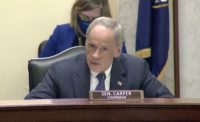Rep. Steve Stivers (R-Ohio) said he planned to introduce a bill to expand offshore oil drilling in areas including the eastern Gulf of Mexico, where there is a moratorium on exploration until 2022 and a site off the coast of Virginia.
Natural Resources Committee Chairman Doc Hastings (R-Wash.) and Rep. Don Young (R-Alaska), former chairman of the transportation and the natural resources committees, said they would introduce legislation to open to oil and gas drilling 3% of the acreage in the Arctic National Wildlife Refuge.
But drilling in ANWR has been strongly opposed by environmental groups and many congressional Democrats.
The heart of Senate EPW committee bill is its federal-aid highway authorization: $39.1 billion in fiscal 2012 and $39.8 billion in 2013.
It also sharply increases the 13-year-old Transportation Infrastructure Finance and Innovation (TIFIA) program, which provides federal loans and loan guarantees to help finance highway and transit projects, to $1 billion a year, from $122 million now.
Lawmakers from both parties like TIFIA because a relatively small direct federal contribution can leverage much larger loans and be combined with other resources to fund multi-billion-dollar projects.
in addition, the measure includes $2.4 billion for roads on federal lands, Indian tribal areas, and in Puerto Rico and other U.S. territories, plus additional funds for research, training, administrative expenses and to repair highways damaged by natural disasters.
Moreover, the bill has provisions aimed at getting roads and bridges built faster, such as “innovative” contracting, early acquisition of rights-of-way and speeding certain projects’ environmental reviews.
One of the most contentious issues, committee leaders said, was the Transportation Enhancements program, which requires states to use about 2% of their overall federal highway aid for paths for bicyclers and pedestrians, and other projects.


